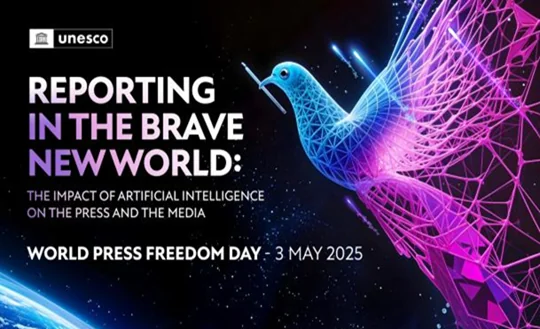As the global media landscape undergoes a profound digital transformation, the theme of this year’s World Press Freedom Day, Reporting in the Brave New World – The Impact of Artificial Intelligence on Press Freedom and the Media, recognizes that press freedom today is not only about freedom from censorship, it is also about equitable access to the tools and technologies such as Artificial Intelligence that define how news is created, distributed and consumed.
While recognizing the advantages of this new technological advancement, UNESCO, through this year’s World Press Freedom Day aims to shed light on risks such as, “AI-generated misinformation and disinformation, deepfake technology, biased content moderation, and surveillance threats to journalists.”
Media Development Investment Fund (MDIF), founded to support independent media in challenging environments where press freedom is under threat, and access to reliable information is limited, has evolved with the changing times and expanded in scope, supporting independent media in adapting to evolving technologies.
With support from our Media Advisory Services-led consultancies, mentorships, workshops, conferences, and peer-to-peer learning, our clients and partners are now using AI to smoothen their newsroom workflows and activities, that helps them focus on their journalistic output.
Talking about MAS’ AI-based work, Luciana Cardoso, our Media Business Advisor, says, “In 2024 two critical workshops held in both Jakarta and Prague brought together nearly 40 MDIF clients who learned how to implement a variety of tools in their workflow, launched collaborations, and were part of important ethical discussions on the journalism impact and benefits of AI tools.”
Wale Lawal, Founder of MDIF client The Republic in Nigeria, talks about the impact of the “AI in News: From innovation to integration” workshop held in Prague in June 2024. He says, “The workshop was an essential step for us in preparing and eventually winning $250,000 from JournalismAI to support developing an AI powered text-to-speech platform.”
Experiences from MDIF clients and partners around the world provide a powerful counterpoint to narratives of AI-induced harm, showing instead how responsible, community-rooted media can use technology to serve the public interest.
In the Philippines, Rappler is experimenting with AI to solve the issue of ensuring higher representation of citizens. People there often complain about their voices not being acknowledged enough by the media. Through aiDialogue, an AI-powered virtual focus group discussion that summarizes large sets of responses, Rappler has been able to tap into to “many more insights than regular survey answers”, as mentioned in the EBU News Report 2025.
In Indonesia, MDIF client Hukumonline has launched Ask Hukumonline, the country’s first domain-specific GPT platform. Drawing from its extensive repository of legal content, the AI assistant helps users navigate complex legal systems, thereby expanding access to justice and raising legal literacy. Another MDIF client in Indonesia Tempo is piloting two AI tools, Tempo Aggregator and Tempo Chatbot. The aggregator curates verified news from Tempo’s database, while the chatbot delivers tailored, real-time responses. Both services aim to enhance information access and decision-making using trusted journalistic sources.
In Colombia, Datasketch, an MDIF client, has partnered with digital outlet Economía para la Pipol (Economy for the People) to develop an AI-powered chatbot aimed at demystifying economics for the general public. Built through the JournalismAI Innovation Challenge, the chatbot responds to over 700 frequently asked questions using clear, accessible language and real-time data from official sources like DANE, Colombia’s national statistics agency. By integrating AI with human-centred design, the tool helps users understand how economic policies affect their daily lives, fostering more informed financial and political decisions.
In Poland, MDIF client Gazeta Wyborcza has been taking measured steps in exploring the role of AI in journalism. A multidisciplinary group of editors, journalists, and technologists convene regularly to assess emerging tools like ChatGPT. While the outlet prohibits using AI to generate content or as a source, it encourages using AI for workflow enhancements.
In Nigeria, Dataphyte leveraged AI-powered analytics to launch a comprehensive election data portal during the country’s elections. By aggregating national and sub-national results, historical trends, and candidate performance data, the platform became a one-stop resource for voters and journalists. This initiative not only fostered electoral transparency but also demonstrated how data journalism can thrive in politically sensitive environments. Apart from this, Dataphyte also partnered with Fedrelandsvennen, a Norwegian newspaper, to launch an AI tool called Nubia which uses Artificial Intelligence to bring together data analytics and storytelling. Without foregoing human oversight, it can automate article production, generate templates, and allow users to view and customize content directly within its interface.
In India, Scroll has addressed the challenge of digital attention spans by converting long-form journalism into bite-sized multimedia. Their URL-to-MP4 tool transforms detailed English and Hindi articles into 30-second videos, enabling audiences to consume complex stories quickly and visually. This tool empowers journalists to blend written content with extracted media for high-impact storytelling delivered in under three minutes.
As AI evolves at an unprecedented speed, the coming year will present a fresh set of challenges for independent media companies. Talking about what she thinks will be the primary challenges and how MAS plans to hlp our clients counter it, Luciana says, “Looking ahead, we recognize that independent media companies will face critical AI-related challenges, such as strategic integration, data readiness, ethical use, and business model adaptation. We are preparing to address these through use cases sharing, partnerships with experts, and the development of learning labs and tool kits designed to support sustainable and ethical AI adoption. As always, there is no ‘one size fits all’ approach and MAS focuses on tailored assistance that benefits both client needs, market shifts and most importantly capacity to execute.”
